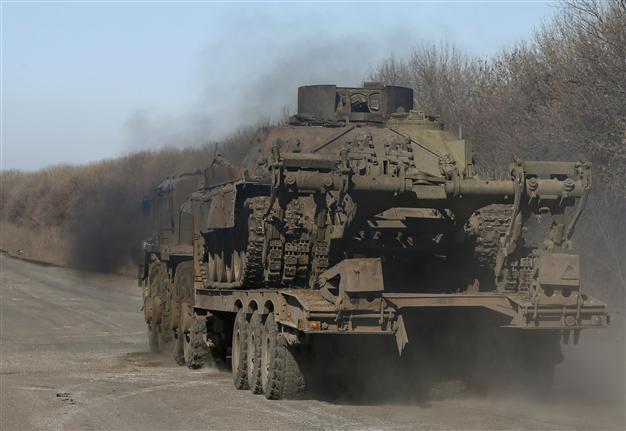Pro-Russian rebels set sights on Ukraine port city despite truce
KYIV - Agence France-Presse

A senior pro-Russian rebel commander said separatist forces were due to begin withdrawing heavy weapons from the front line in east Ukraine on Feb. 23, a sign rebels may be prepared to halt their advance as part of an internationally brokered peace deal. REUTERS Photo.
Pro-Russian forces massing near Ukraine's port city of Mariupol tried to overrun a troop position overnight, Kyiv said on Feb. 23, fuelling concerns for the fate of an internationally brokered ceasefire.
Tensions were also high following a bomb blast Sunday in the eastern city of Kharkiv, well away from the fighting, which killed two people in what authorities called a "terrorist" attack.
The West has warned of additional sanctions on Russia if the shaky truce should deteriorate further, especially after rebels last week took the strategic town of Debaltseve in defiance of the ceasefire meant to start February 15.
A withdrawal of heavy weapons from the frontline -- a key step of the truce -- has still not gone ahead despite both sides on Sunday agreeing to start the process.
"As Ukrainian positions are still being fired upon there can be no talk yet of a withdrawal of arms," military spokesman Vladyslav Seleznyov wrote in a statement on Facebook on Monday.
The rebels, meanwhile, have sent mixed messages, alternately saying that they have pulled back some weapons or that they will start on Tuesday.
Ukraine's military said that clashes overnight dropped off considerably but that insurgent fighters had briefly tried to storm a flashpoint village east of Mariupol, on the Azov Sea coast.
Elsewhere around the conflict zone Kyiv said its forces had only come under fire twice during the night.
Kyiv says Russia has sent 20 tanks and other vehicles and heavy weapons towards Mariupol. Regular fighting has raged in the area near the city and Ukrainian officials said Sunday two tank attacks were reported there.
Moscow denies giving military support to the rebels. However it made the same denials over Crimea -- the Ukrainian Black Sea peninsula that it annexed last year -- before finally admitting that it had deployed troops.
If Mariupol were to fall to the pro-Russian rebels, it would remove a key obstacle to creating a separatist land corridor stretching from Russia's border with Ukraine to Crimea.
The United States and the European Union, however, have strongly warned against further breaches to the ceasefire.
"An advance on Mariupol would clearly be in breach of the agreements" underpinning the truce brokered by Berlin and Paris, German Foreign Minister Frank-Walter Steinmeier said in an interview with his country's Bild newspaper.
France's European affairs minister Harlem Desir, who was in Kyiv on Sunday for a march marking the first anniversary of the overthrow of Ukraine's former pro-Kremlin president Viktor Yanukovych, told reporters the ceasefire "must absolutely be respected".
Otherwise, he said, Western sanctions on Russia would be maintained "and could even be strengthened".
On Saturday, US Secretary of State John Kerry declared that if the ceasefire continued to be violated, "there will be further consequences including consequences that will place added strains on Russia's already troubled economy".
Russia has already been hit by successive rounds of Western sanctions that are savaging its economy, which is headed for recession because of a collapse in oil prices.
Up to now, the main compliance with the truce has been a prisoner swap conducted on Saturday.
The Ukrainian army and the rebels traded nearly 200 fighters seized during the fighting.
Some of the soldiers released had been taken in the rebel assault on Debaltseve. The insurgents said they were still holding hundreds of others taken during that battle.
